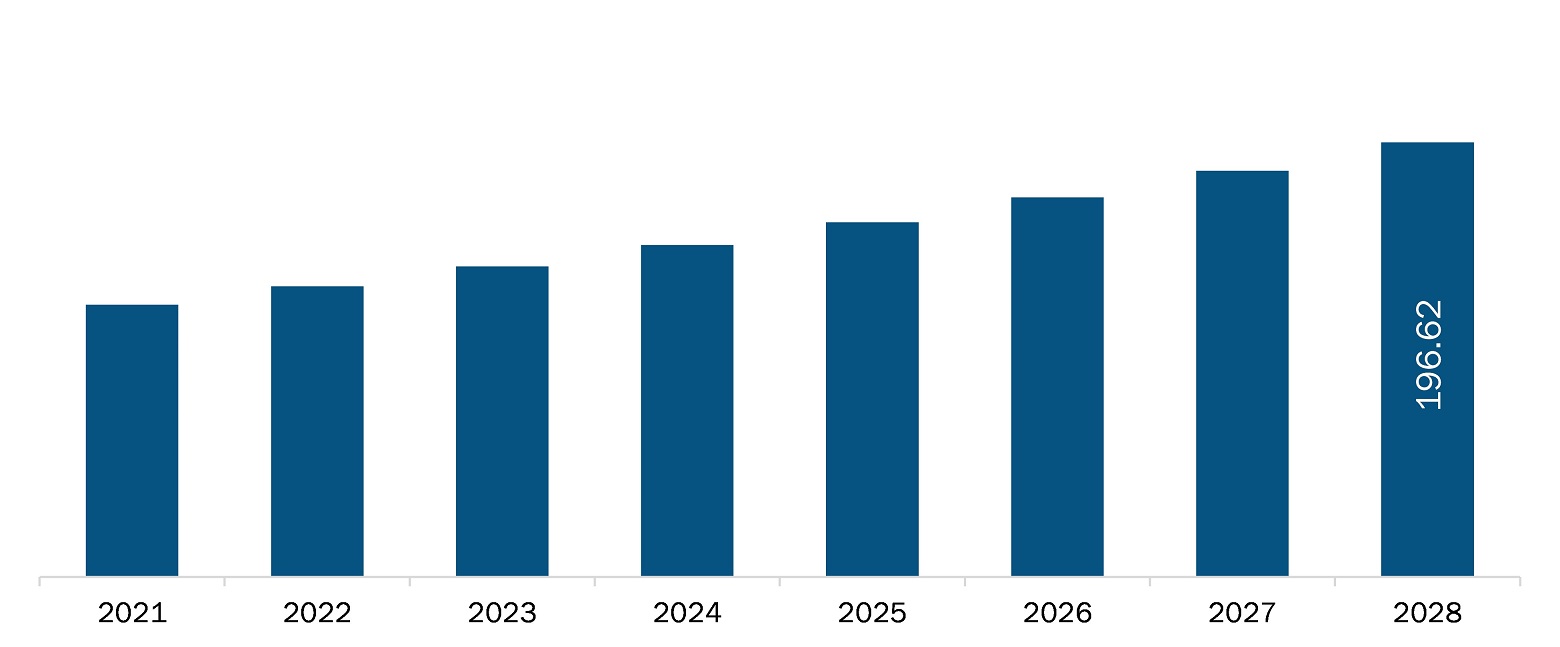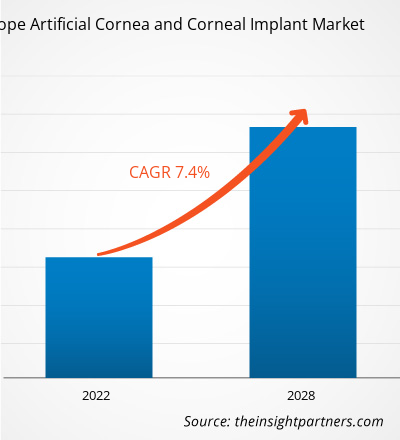The Europe artificial cornea and corneal implant market is expected to reach US$ 196.62 million by 2028 from an estimated value of US$ 123.20 million in 2021; it is likely to grow at a CAGR of 7.4% from 2021 to 2028.
The key factors that are driving the growth of market are rising prevalence of eye diseases that causes corneal blindness, significantly rising elderly population are factors propelling the artificial cornea and corneal implant market. However, the expensive ophthalmology surgeries and devices may hamper the growth of the Europe artificial cornea and corneal implant market in the forecast period.
Rise in geriatric population in developed countries such as the US, the UK and in developing countries such as China, India, and South Korea is driven by the modernization of healthcare facilities and improvements in healthcare services, which have boosted the life expectancy in these countries. According to the United Nation’s World Population Ageing 2017 report, in 2017, Europe had the world’s highest percentage of people of age more than 60, i.e., 25%. Further, by 2050, all regions of the world, except Africa, would have ~25% or more of their populations aged 60 and above. The loss of vision is a major health problem among the elderlies. At the age of 65, one-third of people suffer from an eye disease with impaired vision. Age-related macular degeneration, glaucoma, cataracts, and diabetic retinopathy are the most common causes of vision loss among the people from this age group. Age-related macular degeneration results in the loss of central vision. Optic nerve injury and visual field loss can occur as a result of primary open-angle glaucoma. As this ailment can be asymptomatic at first, elderly people should have regular check-ups. Although cataracts are a common source of visual issues in these people, surgeries to remove them is usually successful. Diabetic retinopathy is also common among the older people during the early stages of diabetes or at the time of diagnosis. When a patient is diagnosed with diabetes, a mydriatic examination is recommended, as well as once a year thereafter. Thus, the rise in geriatric population is fuelling the artificial cornea and corneal implant market growth.
In all European countries, the COVID-19 pandemic resulted in a significant reduction in living and deceased corneal donor and transplantation. The reduction varied between locations within a country and was different for deceased and living donors. In the United Kingdom, there was early signs of deceased donation recovery. Despite considerable resource redirection to combat the epidemic, certain policy modifications were implemented at the national and transplant center levels to ensure safe transplantation. However, the number of corneal transplant procedures in Italy is increasing for several months, and even if it does, there will be a shortage of available. The COVID-19 pandemic worst impacts hospital services. The hospitals are overloaded with COVID-19 patients and other routine patients. Many corneal donor specialists were reassigned to various tasks in ICUs and other COVID-19 related programmes. Due to the ongoing pandemic situation in the European regions, the hospitals in countries such as the UK, Italy, Germany, and others are affected worst affected.

- This FREE sample will include data analysis, ranging from market trends to estimates and forecasts.
EUROPE ARTIFICIAL CORNEA AND CORNEAL IMPLANT MARKET SEGMENTATION
By Type
- Human Cornea
- Artificial Cornea
By Transplant Type
- Penetrating Keratoplasty
- Endothelial Keratoplasty
- Others
By Disease Indication
- Fuchs’ Dystrophy
- Keratoconus
- Fungal Keratitis
- Others
By End User
- Hospitals
- Specialty Clinics and ASCs
- Others
By Country
- UK
- Germany
- France
- Italy
- Spain
- Rest of Europe
Company Profiles
- AJL OPHTHALMIC S.A
- LinkoCare Life Sciences AB
- CORNEA BIOSCIENCES, INC
- EyeYon Medical
- Florida Lions Eye Bank
Europe Artificial Cornea and Corneal Implant Report Scope
| Report Attribute | Details |
|---|---|
| Market size in 2021 | US$ 123.20 Million |
| Market Size by 2028 | US$ 196.62 Million |
| Global CAGR (2021 - 2028) | 7.4% |
| Historical Data | 2019-2020 |
| Forecast period | 2022-2028 |
| Segments Covered |
By Type
|
| Regions and Countries Covered | Europe
|
| Market leaders and key company profiles |
- Historical Analysis (2 Years), Base Year, Forecast (7 Years) with CAGR
- PEST and SWOT Analysis
- Market Size Value / Volume - Global, Regional, Country
- Industry and Competitive Landscape
- Excel Dataset



Report Coverage
Revenue forecast, Company Analysis, Industry landscape, Growth factors, and Trends

Segment Covered
This text is related
to segments covered.

Regional Scope
North America, Europe, Asia Pacific, Middle East & Africa, South & Central America

Country Scope
This text is related
to country scope.
Trends and growth analysis reports related to Life Sciences : READ MORE..
- AJL OPHTHALMIC S.A
- LinkoCare Life Sciences AB
- CORNEA BIOSCIENCES, INC
- EyeYon Medical
- Florida Lions Eye Bank

 Get Free Sample For
Get Free Sample For